YOU Hold the Secret to a New Renaissance in the Arts
To encounter more beauty, you must embrace the beauty of encounter
You have received this newsletter because you subscribed to THE COMIC MUSE, where I, as philosopher and author, help lovers of the arts achieve a philosophically rich understanding of artistic creativity and beauty.
Please consider sharing this post with a likeminded friend.
What follows are the notes to my talk, “The Catholic Artist in the 21st Century,” which I delivered on Saturday, June 7, at the Beauty & Truth Conference hosted by my home institution, Christendom College in Front Royal, Virginia.
Though the talk focuses on the Catholic artist, much of what I say has relevance to a wide range of artists seeking to promote genuine beauty and to rebuild culture.
This link takes you to the video of my talk (along with all the other conference talks). Scroll to the end to find my talk.
Enjoy!
A Compelling Question
Why don’t we see many artworks of the quality of [fill in name of work of GREAT ARTIST here] today?
How do you explain the loss of beauty in our culture, and how do you think we can get it back?
Qualification: we have much beauty from contemporary Catholic artists here at this conference (the sacred painting of Henry Wingate, the poetry of James Matthew Wilson, the sacred music of Frank LaRocca). Even in the mainstream world: the talent is indisputable and we sometimes discover works of undisputed beauty.
Perspective: Between 1945-1965 Catholic novelists and poets received 11 Pulitzer Prizes and 6 National Book Awards (counting Flannery O’Connor’s posthumous 1972 award for her Collected Stories). Waugh’s Brideshead Revisited a Book-of-the-Month Club Selection in 1946. Since then, Catholic writers have not kept pace.
There is more than one reason for this. Certainly, the culture has changed. And we’re in the midst of great flux in the entertainment industry, etc.
But our commitment to artistic craftsmanship has also declined.
And there is also my point today: Our commitment to the kind of culture necessary to produce great artists has also been shaken.
Resisting & Overcoming the Status Quo
What if the answer to the question—How do we get the beauty back in our culture?—has less to do with Catholic artists, and more to do with you?
What if I told you that you are the ones who hold the power to resist the status quo, to spark a new renaissance, and to build a culture that develops more Jane great artists? (And I’m not just talking about your checkbook.)
In the next few minutes, I want to share how you are the great, unrecognized secret to building a culture capable of producing great works of beauty.
So that, by the end of my talk, you’ll be ready to walk out of here primed to make a dent in a universe hell-bent upon keeping us from the beauty we so badly need.
The Great, Unrecognized Secret
The secret comes down to this:
To encounter more beauty, you must encourage the beauty of encounter.
What Do I Mean by The Beauty of Encounter?
A synonym for encounter is “experience.” What is an experience? An experience is when we unite ourselves to some lovable particular with our whole being—not just with our mind and will, but with our body, our senses, our imagination, our memory, our passions: the whole of us.
An encounter or experience is not, then, an idea, much less an algorithm. It’s not a concept; it’s a “concert”—a “public performance” in which we come together “in harmony” with something that we love. Examples. A hike in the mountains or a walk on the beach on a stunningly gorgeous day; the wedding of one of your children; even an intimate conversation with a friend over coffee.
Notice: the highest and best kind of poetic experience is with, and of, a PERSON.
Beauty is not an idea; it’s an encounter, an experience.
OBJECTION! THIS ALL SOUNDS SQUISHY!
You think so? Well, then I’m pulling out the big guns: Cardinal Newman and Pope Benedict 16.
When we recognize beauty as encounter, we can see its power to change us, to transform our hearts. Cardinal Newman:
“The heart is commonly reached, not through reason, but through the imagination, by means of direct impressions, by the testimony of facts and events, by history, by description. Persons influence us, voices melt us, looks subdue us, deeds inflame us. Many a man will love and die upon a dogma: no man will be a martyr for a conclusion….No one, I say, will die for his own calculations: he dies for realities.”
The experience Newman is talking about here is what I like to call “poetic experience.” It is an encounter with beauty that changes.
A family, a neighborhood, a parish, a college, a culture built upon poetic experience has the power to change the world—in part by developing great artists capable of producing great beauty.
Still think poetic experience is a warm and fuzzy feeling? Let’s listen to Pope Benedict XVI in “The Feeling of Things, the Contemplation of Beauty.”
“Being struck and overcome by the beauty of Christ is a more real, more profound knowledge than mere rational deduction. Of course we must not underrate the importance of theological reflection, of exact and precise theological thought; it remains absolutely necessary. But to move from here to disdain or to reject the impact produced by the response of the heart in the encounter with beauty as a true form of knowledge would impoverish us and dry up our faith and our theology. We must rediscover this form of knowledge; it is a pressing need of our time.”
A pressing need of our time. Why is that?
Because we live in what Neil Postman calls a Technopoly: a culture in which technology has become totalitarian.
So our need is to acknowledge a kind of knowing higher (“more real, more profound”) than analytical thinking, rational deduction, and utilitarian-technologized reasoning.
Again:
To encounter more beauty, we must encourage the beauty of encounter (of poetic experience).
The Beauty of a Well-Ordered Culture
But how does the beauty of poetic experience build culture of beauty? To answer this question, I’d like to lead you on a brief encounter with three artists, where we see culture-building IN ACTION.
But first let’s understand: a culture capable of producing great artists will have three characteristics:
Wholeness, Harmony, Splendor.
No surprise, these are the three characteristics of beauty according to St. Thomas Aquinas. See Summa theologiae I, q. 39, a. 8.
As Dominic Rover, O.P. puts Aquinas’s thought:
“For beauty three things are requisite. In the first place, integrity or perfection, for whatsoever things are imperfect, by that very fact are ugly; and due proportion or consonance; and again effulgence: so brightly colored objects are said to be beautiful.”
Poetic Experience in Encounters with Three Artists
A Walk with Gerard Manley Hopkins (Wholeness)
Journal Entry for May 11, 1873 (bluebells):
“Bluebells in Hodder wood, all hanging their heads one way. I caught as well as I could while my companions talked the Greek rightness of their beauty, the lovely/what people call/’gracious’ bidding one to another or all one way, the level or stage or shire of color they make hanging in the air a foot above the grass, and a notable glare the eye may abstract and sever from the blue color/of light beating up from so many glassy heads, which like water is good to float their deeper instress in upon the mind.”
Attention shapes the world. Life in Technopoly restricts our attention to the part, and to the useful, not to the whole, and to the beautiful. We need to expand our attention.
And this means to recall that we are spirits made to lovingly comprehend the wholeness of something. It is getting to the essential or the “point” of something. And ultimately to the “point” of everything. This is simply a definition of the search for wisdom.
Notice that his kind of attention is shaped by our loves—our sensible loves, and our rational loves: “To see what is there, and to see it feelingly” (Gloucester in Lear).
It’s not just the artists who need cultivate this kind of attention. Josef Pieper: this kind of leisurely contemplative attention is the basis of all culture. If we don’t all attend in this way, the entire culture decays. Part of the decay is that we don’t get something like this…recitation of Hopkins’ “Pied Beauty” (1877).
A Visit to Flannery O’Connor’s Andalusia (Harmony)
Poetic experience is by definition communal. It happens within communion. Poetic experience is nurtured by, and seeks to create, harmonious relationships between people and entire communities and institutions dedicated to the beautiful.
What are the “parts” of culture? The family, first and foremost; the neighborhood, the parish, the school, the business, the athletic team, the ballet academy, the market, the thought journal, the college, et cetera. Poetic experience is nested within harmonious relations between these “parts.”
The example of Flannery O’Connor: family farm, parish in Milledgeville, a “neighborhood” of friendships, Iowa Writer’s Workshop and her apprenticeship to other writers like Caroline Gordon and Allen Tate; her continuing Catholic education; supporting, and being supported by, Catholic journals, colleges, and universities.
Dana Gioia has remarked that new artistic movements “grow out of the efforts of a few catalytic individuals who reject a bankrupt or moribund status quo and articulate a compelling new vision.” O’Connor was an artistic and cultural catalyst: she benefited from a pre-existing cultural harmony (Iowa Writer’s Workshop), but she also forged harmonious relationships between the “parts” of culture.
A Visit to Professor Tolkien’s Study (Splendor)
Poetic experience radiates a certain “splendor.” The word makes me think of kings and queens. Splendor of their garments, of their beauty, of their office. Splendor acts like a call to adventure, inviting us to commune with something that is truly great. Even if it is only one of Hopkins’ bluebells.

This is what Newman is after. “Persons influence us, voices melt us, looks subdue us, deeds inflame us.” Poetic experience is a call to change, transformation, adventure. That is its splendor. This splendor is the biggest motivator of the culture.
Tolkien the author reminds us that the Eucharist is the greatest source of splendor. Tolkien’s letter to his son Michael: November 1, 1963, on the romance of the Eucharist:
“Out of the darkness of my life, so much frustrated, I put before you the one great thing to love on earth: the Blessed Sacrament. . . . There you will find romance, glory, honor, fidelity, and the true way of all your loves on earth, and more than that: Death: by the divine paradox, that which ends life, and demands the surrender of all, and yet by the taste—or foretaste—of which alone can what you seek in your earthly relationships (love, faithfulness, joy) be maintained, or take on that complexion of reality, of eternal endurance, which every man’s heart desires.”

We find splendor in the sacramental life and a deep-rooted prayer life more generally. From this splendor the greatest art, and culture, finds its greatest energy. Pieper again: leisure is the basis of culture, and the heart of leisure is divine worship: the response to God’s splendor.
God invites us to cooperate with him by contributing our own craftsmanship in art and our own efforts to build culture—but those efforts need to be joined to the Eucharistic power-source.
Pope Benedict 16 in “The Feeling of Things, the Longing for Beauty”: The Eucharist also reminds us that the splendor of poetic experience is not always pretty, comforting. The splendor of the king is often associated with pain, suffering. Beauty is a wound, a longing—drawing us to God.
Conclusion
To encounter more beauty, we must encourage the beauty of encounter (of poetic experience).
There is an urgency to this. B16: A pressing need of our time.
Call to action: Now it is your turn to make real the power of beauty to change the world.
Because it is what Pope Benedict 16 calls a pressing need of our time, I will soon be offering a new short audio course on poetic experience, how it relates to personal transformation, including its intriguing connection to the making and enjoyment of art.
If you’re interested in being put on my list of those interested in being alerted when the course drops, please let me know in the comments below.

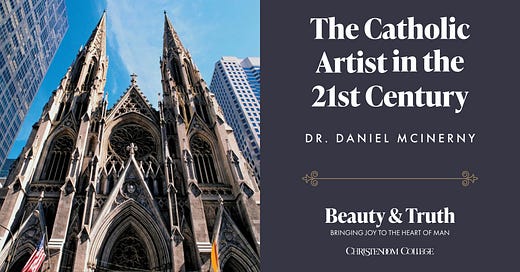





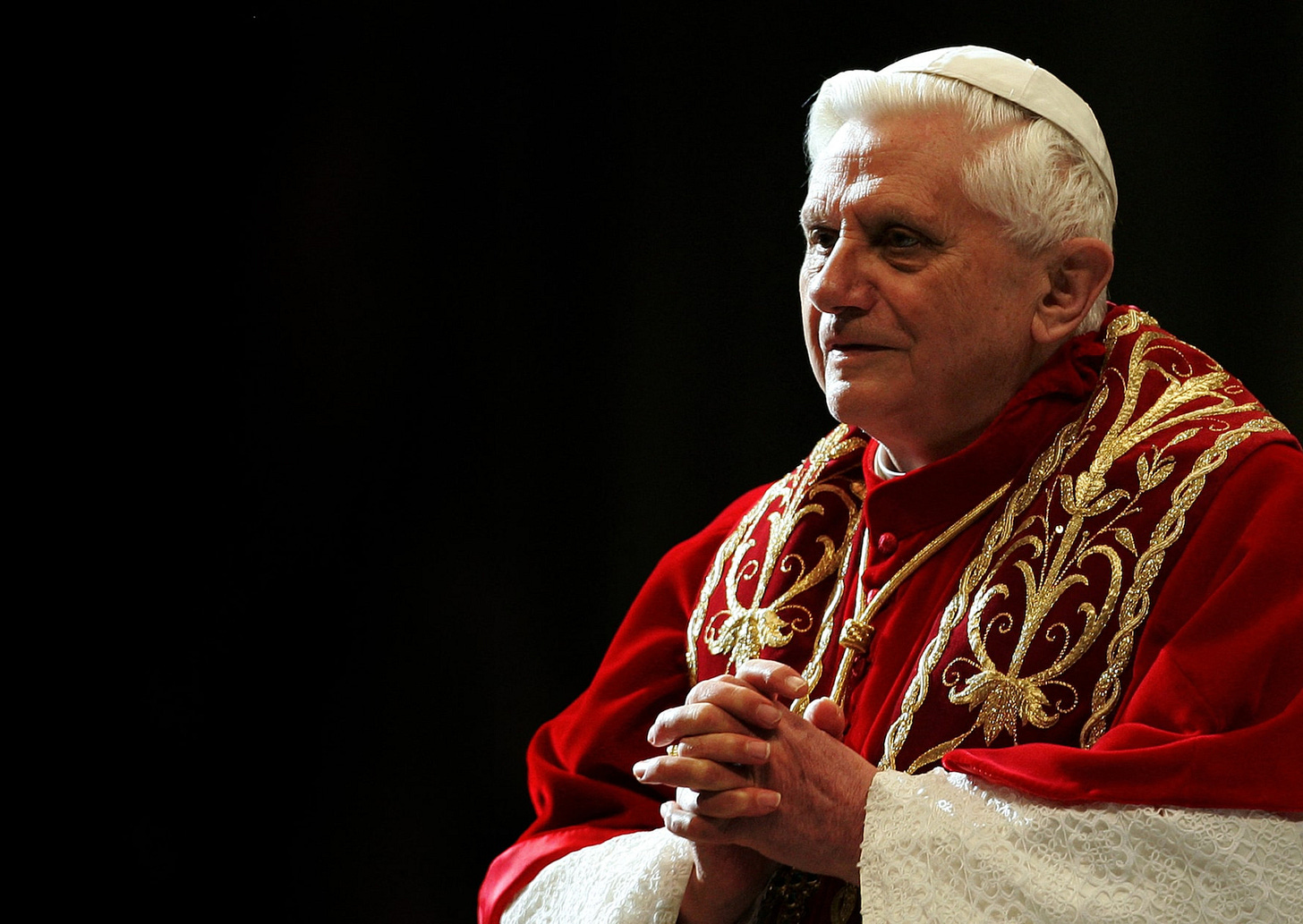

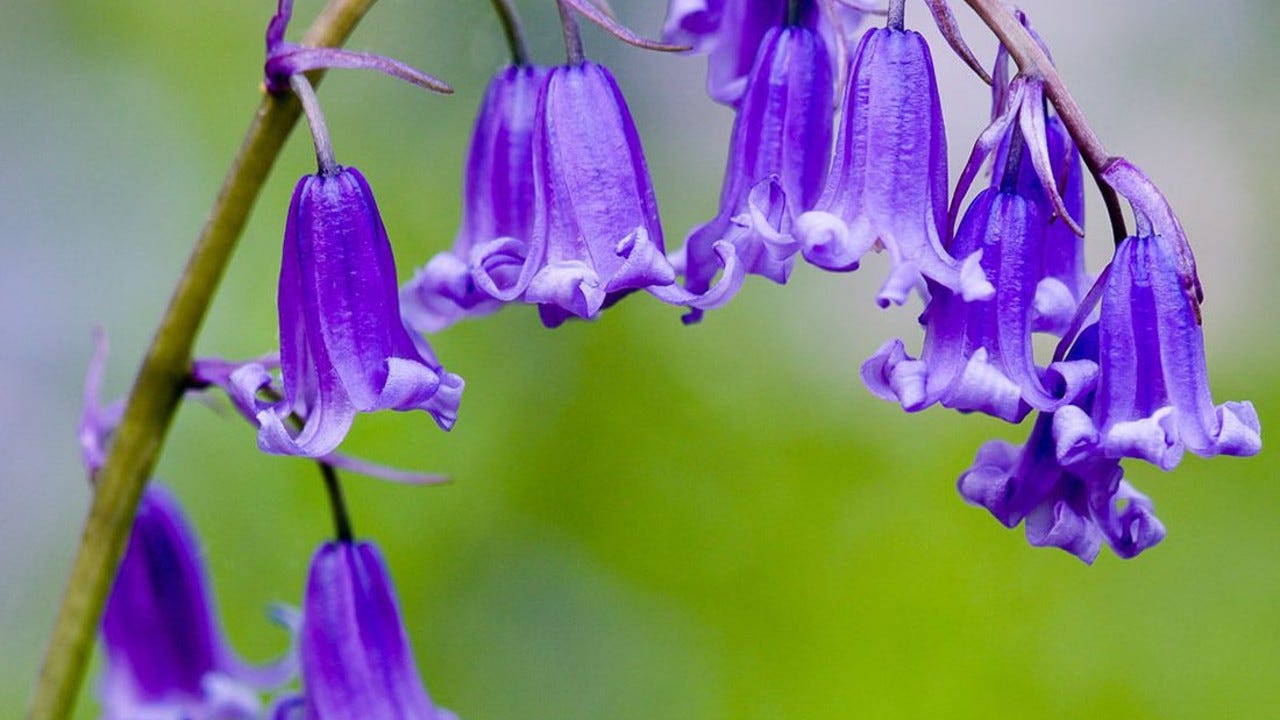

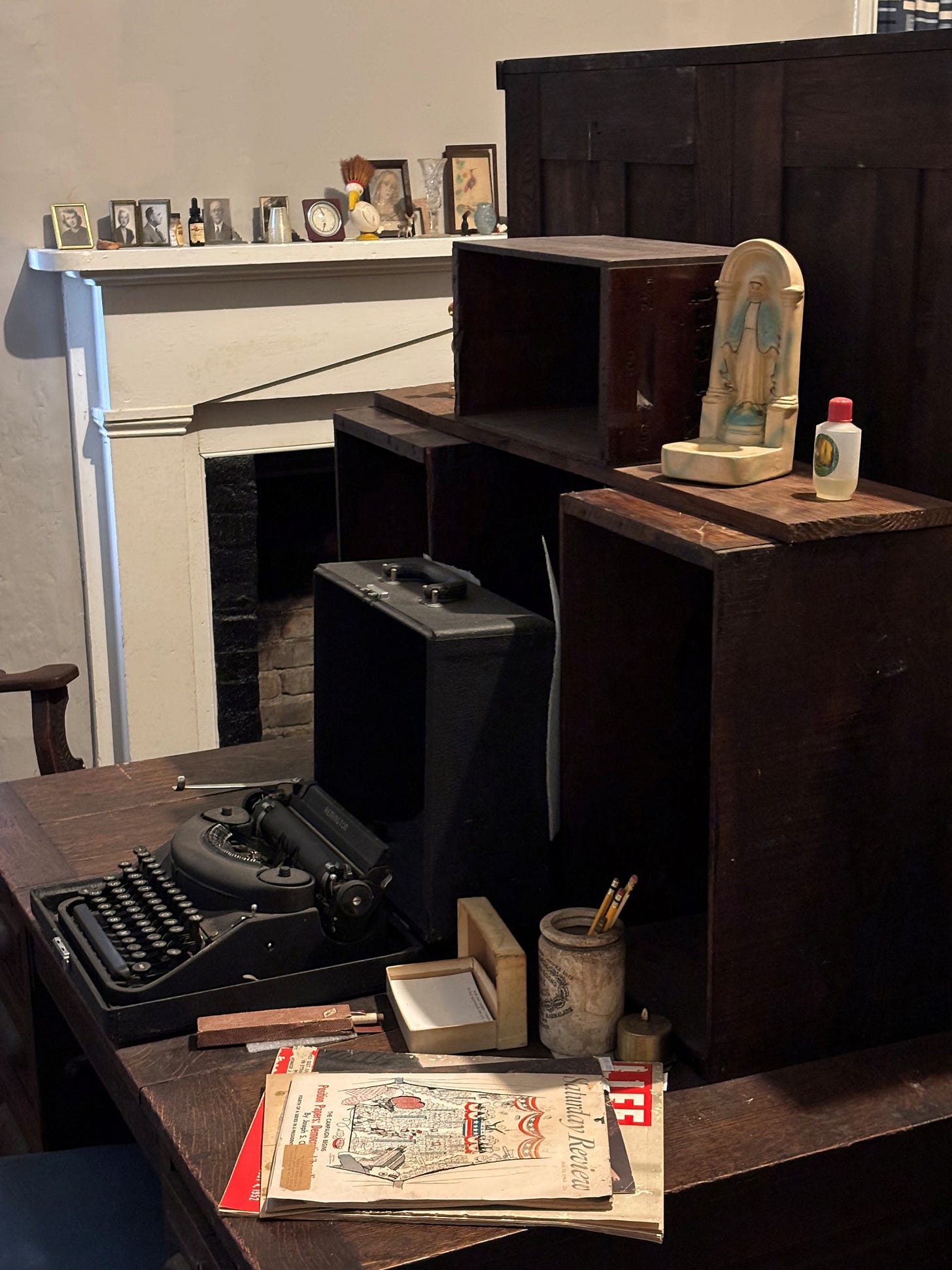
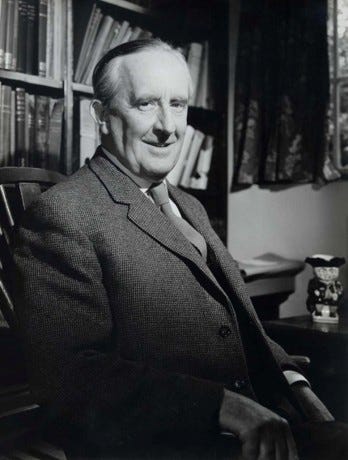
Please put me on the list. I'm interested in providing poetic experiences for my students!
Great talk, Daniel! I’m taking notes: ‘Wholeness, harmony, splendor.’ The section on splendor was so vivid, having recently read The High Hallow. These are exciting times.
I would love to be alerted when the course drops. Thanks!